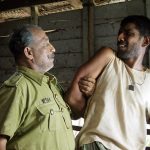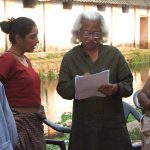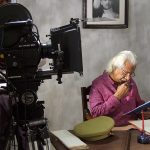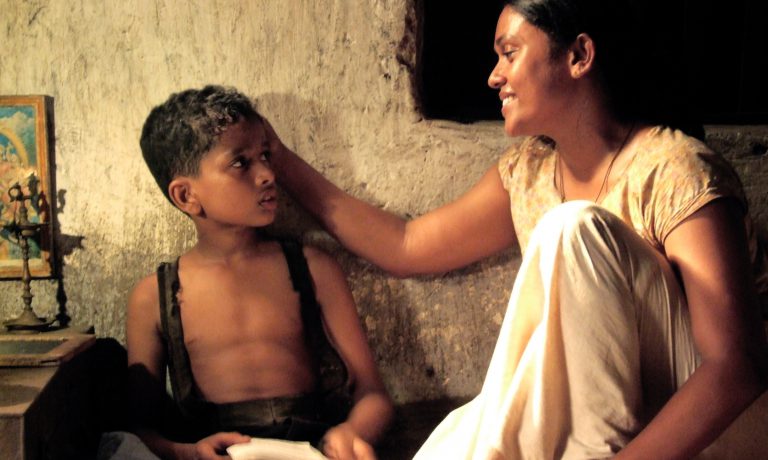Festivals:
Rotterdam, Washington DC, Houston, New Jersey, Fribourg, Madrid, Rome, Split, Dubai, Tampa, Mumbai, Goa, Brasilia, Sao Polo, Rio de Janeiro etc.
Awards:
Kerala State Awards for Best film, Best Director, Best Script, Best Sound and Best Supporting Actor (Female)
Period and background
The 1940s. The Princely State of Travancore, South India. The Second World War being fought in Europe had cast its shadow on colonial British India. Daily necessities like food, clothing, kerosene, petrol were scarce. Unemployment grew while hoarding of grains became routine. Set against such times, the four stories in this film relate to crimes committed by the deprived, as well as the comparatively privileged landed gentry.
Social note:
In Kerala’s traditional matrilineal joint family system prevalent among the land-owning class, women inherited the family house, and men after marriage came to live with their wives.
Short Synopsis
A film about crime in different contexts and situations
- A poor schoolboy fervently yearns to reform his father who is a thief
- Two policemen collude to frame a rickshaw-puller in a burglary of which he is innocent
- A student suffers trauma over having to abort the pregnancy of his girl friend, a domestic
- Two men, one elderly and the other middle aged, fight over a bewitching woman who doesn’t reveal her preferences
Director’s statement
The four chapters of the film tell stories independent of each other. What connects them is the recurring theme of crime. Starting from simple, parable like tales about ordinary people, the narrative slowly takes on questions of love, loyalty and morality leading to complex issues of life. It culminates in the story of the contemporary legend of Panki, the irresistible village beauty who lives naturally. Unlike in my earlier films, here I have used dialogue predominantly to comment, endorse or simply report on the course of the plot to lend the story a narrative form akin to that of the epics where reportage plays a major role in making the experience larger- than- life.
The Thief
 In school, Kunjunni is nicknamed ‘Son of a Thief’. One night, his father Neelantan arrives home after another of his stints in jail. Kunjunni excitedly breaks the news of his father’s return to his friend Kurien, who scornfully asserts that Neelantan will in no time return to prison. A fight ensues. Later, Neelantan meets Kurien’s father, Mathai, and urges him not to pass on the prejudices of parents to children. Mathai takes offence. With his son’s help, he prepares a mass petition to the police chief to keep Neelantan in preventive custody to safeguard village property. Neelantan is locked up. Kunjunni makes his mother promise that on his father’s release, she will persuade him to reform and take a decent job. Two years pass. One day Kunjunni brings the news that Kurien’s house has been burgled. Seeing the full meal laid out in his home and the new clothes bought for him, the boy realizes his father is back to stealing. He is heartbroken.
In school, Kunjunni is nicknamed ‘Son of a Thief’. One night, his father Neelantan arrives home after another of his stints in jail. Kunjunni excitedly breaks the news of his father’s return to his friend Kurien, who scornfully asserts that Neelantan will in no time return to prison. A fight ensues. Later, Neelantan meets Kurien’s father, Mathai, and urges him not to pass on the prejudices of parents to children. Mathai takes offence. With his son’s help, he prepares a mass petition to the police chief to keep Neelantan in preventive custody to safeguard village property. Neelantan is locked up. Kunjunni makes his mother promise that on his father’s release, she will persuade him to reform and take a decent job. Two years pass. One day Kunjunni brings the news that Kurien’s house has been burgled. Seeing the full meal laid out in his home and the new clothes bought for him, the boy realizes his father is back to stealing. He is heartbroken.
Part Two
The Police
 An upright Inspector is posted to the local police station. He finds numerous complaints of corruption pending against the Head Constable and his aide. The Inspector has special instructions to probe the ‘unsolved’ case of a theft in a rich merchant’s shop. It is suspected that Head Constable Pillai has traced the culprit and shared the loot with him. He and his cunning colleague Mathu are given one week’s time to solve the case or face the consequences. Mathu suggests they re-arrest the culprit. Pillai wavers because they have taken their share. The two discuss the dilemma in a local bar. Mathu jumps in excitement when he spots a customer (a rickshaw-puller) in soiled clothes open an envelope full of currency notes. Before the victim realizes what is happening, the two take away his cash and accuse him of the burglary. If he appeals, they say, he will exhaust his savings by having to engage a lawyer and produce witnesses. If he admits to the crime, he will be jailed for ten days at the most. What choice does the poor man have?
An upright Inspector is posted to the local police station. He finds numerous complaints of corruption pending against the Head Constable and his aide. The Inspector has special instructions to probe the ‘unsolved’ case of a theft in a rich merchant’s shop. It is suspected that Head Constable Pillai has traced the culprit and shared the loot with him. He and his cunning colleague Mathu are given one week’s time to solve the case or face the consequences. Mathu suggests they re-arrest the culprit. Pillai wavers because they have taken their share. The two discuss the dilemma in a local bar. Mathu jumps in excitement when he spots a customer (a rickshaw-puller) in soiled clothes open an envelope full of currency notes. Before the victim realizes what is happening, the two take away his cash and accuse him of the burglary. If he appeals, they say, he will exhaust his savings by having to engage a lawyer and produce witnesses. If he admits to the crime, he will be jailed for ten days at the most. What choice does the poor man have?
Part Three
Two Men and a Woman
 Krishnankutty, a university student, is fascinated by a servant girl in the lodge where he is staying. The casual affair turns serious when she shows symptoms of pregnancy. He is entirely dependent on the head of his joint family whose daughter he is under obligation to marry. A distraught Krishnankutty feels he must either terminate the pregnancy or take his own life. He seeks help from his friend and confidante, a lawyer. In a remote backwater, they locate a notorious quack who conducts abortions. The meeting with the drunken quack stirs feelings of both pity and loathing in the young man. Eventually it turns out that the girl is not pregnant. Krishnankutty now finds the courage to make the most difficult decision of his life.
Krishnankutty, a university student, is fascinated by a servant girl in the lodge where he is staying. The casual affair turns serious when she shows symptoms of pregnancy. He is entirely dependent on the head of his joint family whose daughter he is under obligation to marry. A distraught Krishnankutty feels he must either terminate the pregnancy or take his own life. He seeks help from his friend and confidante, a lawyer. In a remote backwater, they locate a notorious quack who conducts abortions. The meeting with the drunken quack stirs feelings of both pity and loathing in the young man. Eventually it turns out that the girl is not pregnant. Krishnankutty now finds the courage to make the most difficult decision of his life.
Part Four
One Woman, Two Men
 The men of the village, like fireflies, are attracted to Panki, a woman of great beauty and grace. Rama Kurup, a man past middle age, is one of the smitten, and forsakes everything to marry her. He guards her jealously. One night, his fears are confirmed when he finds her with a paramour. In the scuffle that follows, Kurup stabs his younger adversary. He goes into hiding while the younger man recovers in hospital. A case is registered against Kurup for attempted murder and a warrant issued for his arrest. An intense police search follows. After a while, a battered and humiliated Kurup returns home on bail. He is overwhelmed as Panki seems to be her old self, tending him with love and care. As the case is fought in the court of law, supporters of the two sides clash on the streets. Panki, urged by both men to depose in each one’s favor, is non-committal. The verdict absolves both of the initial crime, but they are sentenced to three years rigorous imprisonment for inciting murder and mayhem among their followers. In prison, the two men end the enmity that has blighted their lives. On release, they decide to confront Panki together.
The men of the village, like fireflies, are attracted to Panki, a woman of great beauty and grace. Rama Kurup, a man past middle age, is one of the smitten, and forsakes everything to marry her. He guards her jealously. One night, his fears are confirmed when he finds her with a paramour. In the scuffle that follows, Kurup stabs his younger adversary. He goes into hiding while the younger man recovers in hospital. A case is registered against Kurup for attempted murder and a warrant issued for his arrest. An intense police search follows. After a while, a battered and humiliated Kurup returns home on bail. He is overwhelmed as Panki seems to be her old self, tending him with love and care. As the case is fought in the court of law, supporters of the two sides clash on the streets. Panki, urged by both men to depose in each one’s favor, is non-committal. The verdict absolves both of the initial crime, but they are sentenced to three years rigorous imprisonment for inciting murder and mayhem among their followers. In prison, the two men end the enmity that has blighted their lives. On release, they decide to confront Panki together.
Filmmakers and Critics Say
‘In this four-part collection of Short stories set in 2nd World War period, director Adoor Gopalakrishnan presents situations in which protagonists face human predicaments. In ‘The Thief’, a school boy rebuffs slurs on his father being a thief and a jailbird. But the boy is crushed when his desperate belief that his father will reform is proved wrong.’The Police’ is the story of a couple of corrupt policemen who frame a poor riksha-puller to cover their own tracks. In ‘Two Men and a Woman’, a student under the patronage of his joint family head thinks he has made a servant girl pregnant which initially unleashes his shame – and subsequent strength. Finally, ‘One Woman, Two Men’ sees two rivals, vying for the attention of a beautiful woman, who pay a heavy price to win her commitment while she remains enigmatic in her choices.’
(Catalogue, Dubai International Film Festival )
Credits:
- Based on short-stories by: Thakazhi Sivasankara Pillai
- Script, Dialogue and Direction: Adoor Gopalakrishnan
- Cinematography: M.J. Radhakrishnan
- Sound Recording: Krishnanunni, N. Harikumar
- Editing: Ajith
- Decor: Rajasekharan
- Music: Isaac Thomas
- Costumes: Satheesh SB
- Make-up: P. N. Mani
- Chief Assistant: Meera Sahib
- Liaison: Cuckoo Parameswaran
- Production Help: Dr. P. Venugopalan
- Legal Consultant: Adv.Karette B.Haridas
- Still Photography: Chandran Monalisa
- Production Controller: Kettidathil Vijayan
- Production Coordination: Sreekumar
- Outdoor Unit: Chitranjali Studio
- Camera Unit: Prasad Productions
- Laboratory: Prasad Color Lab
- Language : Malayalam
- Duration : 115 Minutes
- Length : 10309 ft (3142. 19 metres)
- Gauge : 35 mm
- Aspect ratio 1:1.85
- Sound : Optical Mono
- Year of Production: August 2008
- Production Company: Adoor Gopalakrishnan Productions
- Produced by: Adoor Gopalakrishnan
- Co-produced by: Benzy Martin
- Produced with the support of: Doordarshan India
Cast & Characters
I. Kallante Makan (The Thief )
- M.R.Gopakumar (Neelantan, the thief)
- Seema G. Nair (Neelantan’s wife)
- Master Amal Jose ( Neelantan’s son)
- Indrans (Mathai, the neighbour)
- KPAC Leela (Maria, Mathai’s wife)
- Master Brolin Thomas (Mathai’s son)
- Mukkottu Gopalakrishnan ( Head master)
- Arya Alphonse (School teacher)
- Gopan (Police Constable),
- Padmanabha Panikkar (Police Constable)
II. Niyamavum Neethiyum (The Police)
- Nedumudi Venu (Maathu – Police constable)
- Jagannathan (Kuttan Pillai – The Head Constable)
- Vijayaraghavan (Police Inspector)
- Krishnakumar (The rikshaw- puller)
- James Mukalel (Bar-tender)
- P.Sreekumar (The Magistrate)
- Prof. Aliyar (Bench-clerk)
- Priyanka (Witness)
- Anup (Witness)
- Padmanabha Panikkar (Witness)
- Ambootty (Lock-up mate)
- Vakkom Mohan (Pleader)
III. Oru Koottukaran (Two Men and A Woman)
- Sudheesh (Krishnankutty – the student)
- Jagadeesh (Advocate – his senior friend)
- P.C. Soman (The Quack)
- Anup (Boat-man)
- Nandan (Advocate’s relative)
IV. Pankiyamma (One Woman, Two Men)
- Praveena ( Pankiyamma)
- Ravi Vallthol (Her husband)
- Manoj.K.Jayan (Her paramour)
- Sukumari (The narrator)
- Babu Namboodiri (Her husband)
- G.K.Pillai (Old Prison inmate)
- Subair (Police Constable)
- Sasthanthala Sahadeven (Jailer)
- Krishna Prasad (Father of Pankiyamma’s baby)
More Stills:
| Kallante Makan (The Thief ) | ||||||
 |
 |
 |
 |
 |
 |
|
| Neethiyum Niyamavum(The Police) | |||
 |
 |
 |
 |
| Oru Koottukaran (Two Men and A Woman) | |
 |
 |
| Pankiyamma (One Woman, Two Men) | |||
 |
 |
 |
 |
Working Stills:
 |
 |
 |

